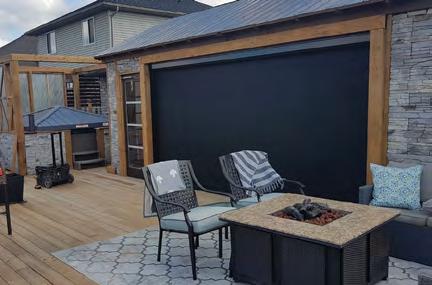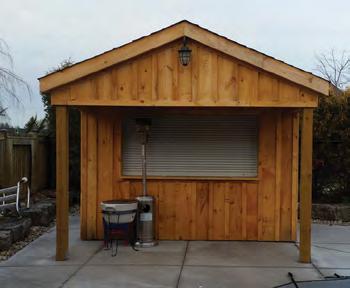
8 minute read
Cover Story
Innovation in Philanthropy
If you Google the definition of innovation, you will see phrases like “new ideas” and “new methods”. These are both true. But from a broader perspective, innovation is about looking at how we are currently doing things, and adapting those practices for greater impact and purpose. Innovation is something we talk a lot about in philanthropy. New solutions are needed to address big issues affecting marginalized people across our community, the country and the world. We wrote an article for the Advocate in the fall of 2018 that also talked about innovation in philanthropy, and it likely could be an annual submission. Kitchener Waterloo Community Foundation (KWCF) continues to be committed to making it easier for businesses, organizations and individuals to do more good, and it’s important to adapt and evolve in the best ways to support those efforts. That is exactly what KWCF has been thinking about and doing over the past year. And, it’s become even more important in the time of COVID-19, when so many have been negatively impacted by the pandemic. Through innovation, there is hope. Today, we want to share three examples of ways KWCF is collaborating with businesses and organizations to innovate in the philanthropic space. These include: setting up community-based funds that make it easier for businesses to participate in fundraising efforts, collaborating with businesses to support needs in our community, and partnering with others across Waterloo Region to tackle critical issues like affordable housing.
Community-based fundraising
This year, KWCF collaborated with local community champions to help manage donations through an endowment fund that also has a flow-through component. This allows dollars raised to flow right back out in the community, during a period when funds are needed immediately, while still ensuring there are funds invested to be able to grant into the community in the longer-term. One example is the Farwell4Hire Fund. The Farwell4Hire campaign started in 2014 with a simple tweet. Mike Farwell offered his services as a lawn-mower, car-washer, gardenweeder, and countless other tasks in exchange for a donation to cystic fibrosis. “It was as grassroots as you can get,” says Farwell.
In 2020, the campaign came together for community – helping charitable organizations that were struggling to respond to the COVID-19 pandemic while continuing to serve vulnerable people across Waterloo Region. Farwell approached KWCF to partner on this initiative. And by partnering with KWCF on a community-based fund, it gave local businesses an opportunity to get on-board — and according to Farwell, “that's when everything changed”. Instead of Farwell himself washing windows or weeding gardens for individual community members, now businesses also had an opportunity to participate by donating a portion of their sales or profit to the campaign. "Not only did it open up our campaign to a brand new and much larger audience, but it also allowed businesses to demonstrate their commitment to community,” says Farwell. “What better way to say you’re invested in where you work than by supporting a charity where the funds raised in the community, stay in the community? It’s obvious that businesses in Waterloo Region put community first.” The business community has also stepped up to help with campaigns where COVID has impacted the physical donation of items. This includes the ToastyToes Waterloo Region campaign, which has been collecting socks for Out of the Cold shelters since 2013.
In 2020, ToastyToes creator Sharon Gilroy-Dreher asked charitable organizations supporting our most vulnerable neighbours how they wanted to receive socks. They responded that having access to funds, and the flexibility to purchase socks when they needed them, would be best moving forward. Then, with KWCF’s help, Sharon was able to set up a fund that could help facilitate that. (The current campaign runs until December 10, 2020). “I had to reimagine how ToastyToes would happen in the community,” says Gilroy-Dreher. “Now that the shift has been made to collecting funds, I took a chance and connected with some customer-facing businesses in the retail and food services space, in addition to the traditional brick-and-mortar, office-based businesses that had supported me for years. As a result I have a real mix of wonderful businesses, some workfrom-home and office-based staff, and some new independent customer-facing companies as well.” These are just two examples of the community-based funds created to support local fundraising efforts. Other examples include the:
• Heart Beats Hate Fund, established by business and community leader Alan Quarry to help encourage kindness • Black Community Solidarity Fund, created to increase sustainability of youth-focused and community-care projects of the African Community Wellness Initiative (ACWI) and other Black-led organizations • Communitech COVID-19 Response Fund, which saw
the local tech community turn every $1 donated into $3 through Communitech’s “This, Too, Will, Pass” campaign, resulting in over $208,000 raised to support seven local charities.
Collaborating to support local action
The discrimination, racial injustices and inequities facing people across Waterloo Region has been amplified in the face of the pandemic. Black, Indigenous, and People of Colour (BIPOC) communities are being disproportionately affected by COVID-19. In response, KWCF launched the COVID-19 BIPOC Sustainability & Recovery Fund Grant as a pilot initiative in October.
It was essential to work with a volunteer committee comprised of Black, Indigenous, and People of Colour from Waterloo Region to develop the fund and make allocation decisions. Money will be distributed to BIPOCled organizations, or initiatives led by BIPOC people, that are doing important work to help local BIPOC community members recover from the impacts of COVID-19. In this instance, the example of business involvement is through partnership. Green Shield Canada (GSC), a national health benefits specialist, upon learning about the creation of the fund, immediately stepped forward to increase the amount available to grant by an additional $25,000. “Our purpose is to make it easier for people to live their healthiest lives, and the events of this year have heightened the need for support,” said Mila Lucio, Executive Vice President, Human Resources and Social Impact at GSC. “We were pleased to support KWCF’s efforts to help community organizations dealing with the impact of COVID-19, and are glad to have the opportunity to be involved in their new BIPOC Sustainability and Recovery Fund. We know COVID-19 has disproportionally affected BIPOC communities and as part of our Diversity, Equity & Inclusion journey we are committed to help tackle racial injustice and make our communities more equitable and inclusive. We commend KWCF for starting this innovative fund and are calling for other companies to join in giving their support.”
Partnering to solve key issues
Affordable Housing is another critical issue in Waterloo Region. In early 2020, KWCF convened a collaborative innovation roundtable with representatives from the public, private and philanthropic sectors in an effort to catalyze impact in two areas of the Housing Continuum: affordable rental housing and affordable home ownership. Together, this partnership formed a Housing Innovation Round Table (HIRT) to: • Foster and inspire innovation in affordable rental housing and affordable home ownership • Convene thought leadership • Encourage, facilitate and test collaborative approaches to address housing inequities. The HIRT is focused on collaborative action and applied research and learning methods. By June 2020, we had identified several potential experiments that built on both the skill sets within the roundtable, as well as the perceived needs and opportunities in our community. We have been somewhat organic in the nature of our process, moving between big picture system discussions and exploring very specific interventions. One of the strengths of this group is the ability to move between the two very easily, and to challenge each other on where our focus should be placed. The diverse participants and perspectives also ensure that our actions and interventions are balanced and that we maintain a positive tension between advocacy and action. Thank you for reading about some of the ways Chamber Members and other community-minded individuals have been partnering with KWCF in 2020. I’d love to discuss any other innovative ideas you might have to work together to create impact for those in need, while ensuring alignment with your organization’s goals and values. Please give me a call or send me an email. By collaborating, it is possible to do more good, forever, together.
ABOUT THE AUTHOR Elizabeth Heald
Elizabeth Heald is the President & CEO of Kitchener Waterloo Community Foundation (KWCF), an organization focused on “Making it Easy for People to Do More Good.” You can contact Elizabeth at 519-725-1806 x 201 or at elizabeth@
Is your organization leaking money?
Could you use simple cost-cutting ideas? Would you like to be environmentally responsible at the same time?
Let us help you reduce your water consumption. From simple tweaks to larger projects, we’ll help you shave your bill. It starts with a FREE no strings attached water use review, leading to optional 50/50 cost sharing of audits or of consulting fees, rebates and more.
Program for Business Region of Waterloo, Water Services 519-575-4400
TTY: 519-575-4608 Email: wbrabazon@regionofwaterloo.ca www.regionofwaterloo.ca/water
Our service is free, so call now to see what we can do for you while funds last.
Did You Know? We also offer the following products
Garage Customization
• Hoists • Flooring • Cabinets
Backyard Customization
• Screens for Patios and Pool Cabanas • Security Shutters
Commercial and Industrial
• Sales and Service
255 Bathurst Drive Waterloo ON N2V 2E4 519-888-9111









